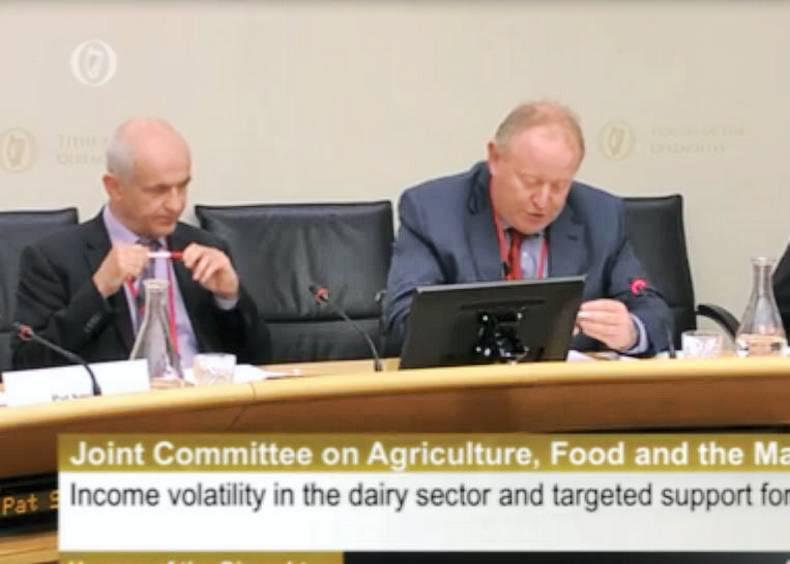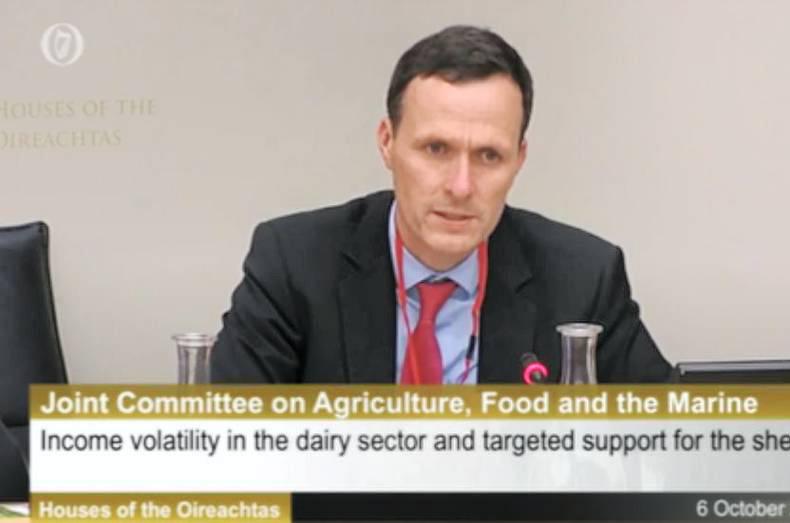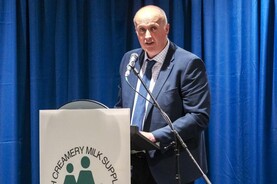“Coming in at an expansion phase, there are a number of difficulties there that have made the dairy crisis worse,” said IFA National Dairy Committee chairman Sean O’Leary. “This is not your normal 12- to 18-month cycle; the trough has lasted a lot longer than expected and there are lessons to be learned from this.”
IFA president Eddie Downey highlighted that banking is critically important in the dairy sector.
“Dairy farmers need sensible lending,” said Downey. “A milking parlour is built as an investment for the next 20 to 30 years, not one. Sensible banking will give farmers a better control of costs. However, it is important that farmers act responsibly too. They need to adopt a better-before-bigger approach.”
Extreme income volatility for dairy farmers has been the norm since 2007. Downey said that farmers will need tax policies and milk price instruments to help them manage.
“In addition, farmers will need well-resourced advisory services to help them improve efficiencies further. The Government must also ensure that the banks give farmers access to flexible, internationally competitively priced finance with variable repayments to reflect income variations,” he added. “The Government must secure climate change legislation which gives farmers credit for their low carbon footprint in the global context and which does not prevent them from expanding sustainably.”
In the short- to medium-term, the biggest issue for dairy farmers is cashflow and it will get more problematic in spring, with lower constituents depressing milk returns further. Sean O’Leary urged industry stakeholders, banks and the Government to urgently take action individually and collectively to help farmers deal with the new reality of extreme income volatility for the long-term.
“In our dairy expansion plans, we must nurture our domestic market for liquid milk – at €530m retail value, it is worth nearly 20% of our dairy exports,” said Liquid Milk Committee chairman Teddy Cashman. “Following the first winter after the end of quotas, liquid milk producers have more options. Unless they are provided with payment systems which fully remunerate their costs, liquid milk producers will vote with their feet, with negative consequences for the consistent availability of fresh, local milk for consumers.”
He also argued that instruments such as a ban on below selling would be hugely beneficial.
“From the point of the retail scenario, it’s just about fairness,” said Cashman.
Chairman of the Oireachtas Committee on Agriculture Andrew Doyle has identified the next step as bringing in the banks and, depending on time, Ornua and Bord Bia.
Read more
TAMS II funding for sheep fencing is a ‘no-brainer’
“Coming in at an expansion phase, there are a number of difficulties there that have made the dairy crisis worse,” said IFA National Dairy Committee chairman Sean O’Leary. “This is not your normal 12- to 18-month cycle; the trough has lasted a lot longer than expected and there are lessons to be learned from this.”
IFA president Eddie Downey highlighted that banking is critically important in the dairy sector.
“Dairy farmers need sensible lending,” said Downey. “A milking parlour is built as an investment for the next 20 to 30 years, not one. Sensible banking will give farmers a better control of costs. However, it is important that farmers act responsibly too. They need to adopt a better-before-bigger approach.”
Extreme income volatility for dairy farmers has been the norm since 2007. Downey said that farmers will need tax policies and milk price instruments to help them manage.
“In addition, farmers will need well-resourced advisory services to help them improve efficiencies further. The Government must also ensure that the banks give farmers access to flexible, internationally competitively priced finance with variable repayments to reflect income variations,” he added. “The Government must secure climate change legislation which gives farmers credit for their low carbon footprint in the global context and which does not prevent them from expanding sustainably.”
In the short- to medium-term, the biggest issue for dairy farmers is cashflow and it will get more problematic in spring, with lower constituents depressing milk returns further. Sean O’Leary urged industry stakeholders, banks and the Government to urgently take action individually and collectively to help farmers deal with the new reality of extreme income volatility for the long-term.
“In our dairy expansion plans, we must nurture our domestic market for liquid milk – at €530m retail value, it is worth nearly 20% of our dairy exports,” said Liquid Milk Committee chairman Teddy Cashman. “Following the first winter after the end of quotas, liquid milk producers have more options. Unless they are provided with payment systems which fully remunerate their costs, liquid milk producers will vote with their feet, with negative consequences for the consistent availability of fresh, local milk for consumers.”
He also argued that instruments such as a ban on below selling would be hugely beneficial.
“From the point of the retail scenario, it’s just about fairness,” said Cashman.
Chairman of the Oireachtas Committee on Agriculture Andrew Doyle has identified the next step as bringing in the banks and, depending on time, Ornua and Bord Bia.
Read more
TAMS II funding for sheep fencing is a ‘no-brainer’






 This is a subscriber-only article
This is a subscriber-only article












SHARING OPTIONS: